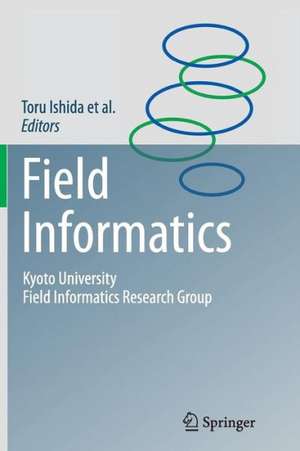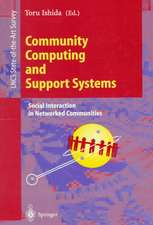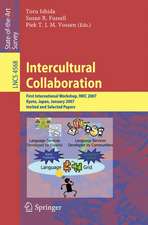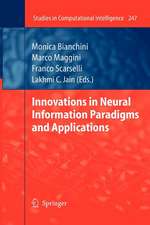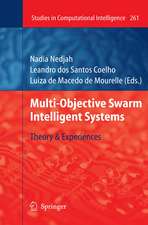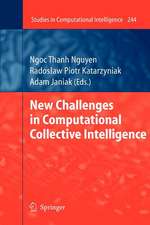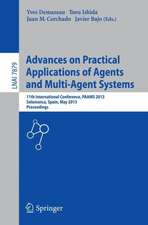Field Informatics: Kyoto University Field Informatics Research Group
Editat de Toru Ishidaen Limba Engleză Paperback – 9 aug 2014
The authors are specialists in diverse areas such as informatics, engineering, agriculture, sociology and pedagogy, and their areas of interest range from environment conservation to social education for international cooperation. They have a particular focus on the environment in southeast Asia and related topics such as large-scale traffic simulations, participatory workshops, inclusive design workshops, distance learning, and intercultural collaboration.
This book targets graduate students seeking tools and methodologies for natural observation, field workers engaged in social participation, and researchers and engineers pursuing innovation. The techniques described in the book could also be exploited by government officials to form consensus and develop activities or by non-profit organizations to undertake more effective social programs.
| Toate formatele și edițiile | Preț | Express |
|---|---|---|
| Paperback (1) | 327.12 lei 6-8 săpt. | |
| Springer Berlin, Heidelberg – 9 aug 2014 | 327.12 lei 6-8 săpt. | |
| Hardback (1) | 312.87 lei 38-44 zile | |
| Springer Berlin, Heidelberg – 27 iul 2012 | 312.87 lei 38-44 zile |
Preț: 327.12 lei
Preț vechi: 408.89 lei
-20% Nou
Puncte Express: 491
Preț estimativ în valută:
62.59€ • 65.53$ • 51.79£
62.59€ • 65.53$ • 51.79£
Carte tipărită la comandă
Livrare economică 05-19 aprilie
Preluare comenzi: 021 569.72.76
Specificații
ISBN-13: 9783642440885
ISBN-10: 3642440886
Pagini: 188
Ilustrații: XIV, 174 p.
Dimensiuni: 155 x 235 x 10 mm
Greutate: 0.27 kg
Ediția:2012
Editura: Springer Berlin, Heidelberg
Colecția Springer
Locul publicării:Berlin, Heidelberg, Germany
ISBN-10: 3642440886
Pagini: 188
Ilustrații: XIV, 174 p.
Dimensiuni: 155 x 235 x 10 mm
Greutate: 0.27 kg
Ediția:2012
Editura: Springer Berlin, Heidelberg
Colecția Springer
Locul publicării:Berlin, Heidelberg, Germany
Public țintă
ResearchCuprins
Chap. 1 Remote Sensing and Geographic Information Systems (Tetsuro Sakai).- Chap. 2 Biologging (Nobuaki Arai, Junichi Okuyama).- Chap. 3 Human Sensing (Yuichi Nakamura).- Chap. 4 Ethnography (Takaaki Tsuji)Chap. 5 - System Dynamics (Kazuyuki Moriya).- Chap. 6 Multi-agent Simulation (Toru Ishida, Hiromitsu Hattori, Yuu Nakajima).- Chap. 7 Inclusive Design (Takayuki Shiose).- Chap. 8 Participatory Design (Yutaka Yamauchi).- Chap. 9 Case Writing (Shigeo Matsubara).- Chap. 10 Outreach Communication (Reiko Hishiyama).
Recenzii
"In this very complex and dynamic world, we need to cope with heterogeneous natural, economic, and social challenges. It is common and suitable to respond to many of these challenges with information and communications technology (ICT). The authors present a coherent approach based on a branch of ICT, field informatics, to solve various non-analytical problems arising from specific spatiotemporal areas, such as a hilly region affected by increasing depopulation, for example. ... The book includes a wide range of realistic scenarios and case studies, including land cover sensing, behavior analysis of green turtles, the protection of elderly people, traffic and disaster evacuation simulations, an agricultural land use decision model, and the design of a workshop on information-based navigation systems. The chapter sequence follows the logical steps of the field informatics concept: description, evaluation and estimation, design and implementation, and dissemination. This book is based on the authors’ experience, gained from in-field ICT project development. It targets a large spectrum of potential readers, from graduate students, researchers, and design engineers to those working in nonprofit organizations, economic entities, and public services." [Valentin Inceu, ACM Computing Reviews, 2013]
Notă biografică
Toru Ishida is a professor in the Dept. of Social Informatics at Kyoto University. He was a research scientist at NTT Laboratories, and has spent time at many leading academic institutions as a visiting scholar or professor, including Columbia University, Technische Universität München, Université Pierre et Marie Curie, the University of Maryland, Shanghai Jiao Tong University, and Tsinghua University. His particular research interest is social informatics, and he manages research projects in the areas of digital cities and intercultural collaboration. He has been an IEEE fellow since 2002.
Textul de pe ultima copertă
Here we use the term "field" to refer to a sphere of practical operation, and correspondingly the term "field informatics" describes informatics tools and methodologies that arise in the field. The components of field informatics are description, prediction, design and transfer, and the methods for those components vary widely. For example, we consider the social goal of revitalizing a mountainous area experiencing depopulation and we show how the tools and methodologies of field informatics may be used to describe such situations using remote sensing, biologging, human sensing and ethnography; the effects of various solutions can be predicted using system dynamics and multiagent simulations; the solutions can be designed using inclusive design or participatory design methods; and finally the experience gained can be transferred using case writing and outreach communication.
The authors are specialists in diverse areas such as informatics, engineering, agriculture, sociology and pedagogy, and their areas of interest range from environment conservation to social education for international cooperation. They have a particular focus on the environment in southeast Asia and related topics such as large-scale traffic simulations, participatory workshops, inclusive design workshops, distance learning, and intercultural collaboration.
This book targets graduate students seeking tools and methodologies for natural observation, field workers engaged in social participation, and researchers and engineers pursuing innovation. The techniques described in the book could also be exploited by government officials to form consensus and develop activities or by non-profit organizations to undertake more effective social programs.
The authors are specialists in diverse areas such as informatics, engineering, agriculture, sociology and pedagogy, and their areas of interest range from environment conservation to social education for international cooperation. They have a particular focus on the environment in southeast Asia and related topics such as large-scale traffic simulations, participatory workshops, inclusive design workshops, distance learning, and intercultural collaboration.
This book targets graduate students seeking tools and methodologies for natural observation, field workers engaged in social participation, and researchers and engineers pursuing innovation. The techniques described in the book could also be exploited by government officials to form consensus and develop activities or by non-profit organizations to undertake more effective social programs.
Caracteristici
First book describing Field Informatics, a novel area of research Will be valuable for researchers in artificial intelligence Contributing authors are leading experts in this area Includes supplementary material: sn.pub/extras
